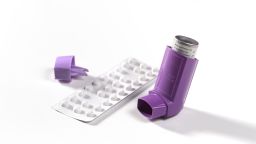An ongoing shortage of a medicine commonly used to treat people with breathing problems is expected to get worse after a major supplier to US hospitals shut down last week.
Liquid albuterol has been in short supply since last summer, according to the American Society of Health-System Pharmacists. It has been on the US Food and Drug Administration’s shortages list since October. The news of the plant shutdown worries some doctors who work with patients with breathing problems such as asthma.
“This is definitely concerning, especially as we are coming out of the respiratory season where we had a big demand with RSV, Covid-19 and flu, and are now heading into spring allergy season when a lot of kids and adults experience asthma symptoms,” said Dr. Juanita Mora, a national volunteer medical spokesperson for the American Lung Association and an allergist/immunologist based in Chicago. “This is a life-saving drug and being able to breathe is vital for everyone.”
The manufacturer that recently shut down, Akorn Operating Company LLC, had filed for Chapter 11 bankruptcy in May 2020.
It was the only company to make certain albuterol products used for continuous nebulizer treatment. It’s a staple in children’s hospitals, but had been out of stock since last fall. Without that particular form of the product, hospitals have had to scramble to find alternatives.
“Members are either forced to compound it themselves to make the product or go to an outside third party source who is compounding the product,” said Paula Gurz, senior director of pharmacy contracting with Premier Inc., a major group purchasing company for hospitals.
With the Akorn shutdown, Gurz said products from the one remaining major domestic source of liquid albuterol, Nephron Pharmacuticals, have been on back order. Nephron just started shipping albuterol last Friday, Gurz said, but to get back on track, “it’s going to be an uphill climb.”
Hospitals work around shortages
Hospitals around the country said they’re watching the supply chain – and their current stock – closely. There’s concern they might have to delay discharging patients because they don’t have enough medicine, or that they may see more ER visits for people with breathing problems who don’t have access to medicine.
Dr. Eryn Piper, a clinical pharmacist at Children’s Hospital of New Orleans, said her hospital has been largely unaffected so far, but for months she has heard about retail pharmacies and other health systems that have had issues with albuterol shortages.
“The big problem we’ve been hearing about is inhalation solutions, not really the inhalers, it’s more like the solutions that go into the nebulizer machines for inhalation that the patients breath in,” said Piper.
Without the larger Akorn product, staff at Lurie Children’s Hospital in Chicago had to squeeze out the albuterol contents from smaller packages.
It’s “time-consuming and labor-intensive as it takes opening 40 containers to equal 20 mL (each patient on continuous albuterol requires 3-5 syringes per day),” said hospital spokesperson Julianne Bardele in an email.
When Nephron was unable to meet demand due to manufacturing issues, Bardele said Lurie had to make another temporary switch to a different concentration and use an alternative liquid bronchodilator, levalbuterol.
Most hospital pharmacies are aware of supply issues for many medicines, particularly pediatric medicines, said T.J. Grimm, the director of retail and ambulatory services at University Hospitals Cleveland Medical Center, and they try to keep a higher stock – especially of the less expensive medicines like albuterol.
“Just so we can cover situations like this,” Grimm said.
Grimm said his system has albuterol supply for a couple of months still, but he’s frustrated and concerned about the supply chain.
“When you have supply chains that are just-in-time, it can create some issues with when something goes off,” Grimm added. “There’s the short-term crisis we all have to get through and then there’s a longer term. We need to think about these things a little more strategically, especially with our kids.”
Jerrod Milton, the chief clinical officer at Children’s Hospital Colorado, said they’ve been paying close attention to the albuterol shortages for many months. The hospital has experienced shortages in the past, and has continued to implement protocols to conserve doses.
“Challenges are what we deal with when it comes to pediatric medicine. We consider most of the kids that we take care of as somewhat therapeutic orphans,” Milton said. “It’s just another one of the myriad of shortages that we have to deal with, I guess.”
Supply chain concerns
Jessica Daley, the group vice president of strategic sourcing for Premier, said that she doesn’t anticipate that the albuterol shortage will be an ongoing problem for years, but when the market has only a handful of suppliers, “it makes for a very tight market, a very concerning market right now.”
Daley said there are things hospitals can do to help, such as protocol changes, making products on site and finding different suppliers.
The Children’s Hospital Association stepped in to help when it heard from members having difficulty finding enough supply. The association worked with STAQ Pharma, a facility that provides compounded pediatric medication, to start production on batches of albuterol for children’s hospitals in the sizes they needed.
“We’ve been creative and trying to work proactively. So when we think there’s going to be a problem, we’re trying to plan ahead,” said Terri Lyle Wilson, director of supply chain services for the Children’s Hospital Association.
STAQ should be at full production by May, so hospitals will have a steady, stable supply ahead of the next season in which respiratory viruses are in wide circulation, the association says.
Daley at Premier said that in an ideal world, there would be more suppliers of these products, particularly with generic drugs, so that when there is a problem with one, the market could handle it. When there is a concentration of manufacturing with a small number of suppliers, it is very hard to recover, she said.
“We really advocate for diversity and supply to prevent types these types of issues,” Daley said. “Meaning at least three globally, geographically diverse suppliers that are supplying the market with sufficient products.”
Guidance for patients
For patients, Piper at Children’s Hospital of New Orleans said they are encouraging patients with breathing problems to take precautions and avoid asthma triggers if possible. She said if a patient’s usual pharmacy runs out, it’s also good to check with a doctor to see if there is another medication that’s available.
Inhalers don’t seem to be impacted by the shortage so far, but Daley said if people panic about the lack of albuterol for hospitals, that could change.
Get CNN Health's weekly newsletter
- Sign up here to get The Results Are In with Dr. Sanjay Gupta every Friday from the CNN Health team.
“Albuterol is one of those things that if there’s a patient who needs it, you want to have it all the time. So there’s always that potential for the market to respond and react in a way that that will then create downstream shortages of other sizes or presentations of a product,” Daley said.
To avoid that problem, Milton at Children’s Hospital Colorado said it’s simple: “Talk to a provider and see if there are alternatives,” Milton said. “And please don’t hoard.”









